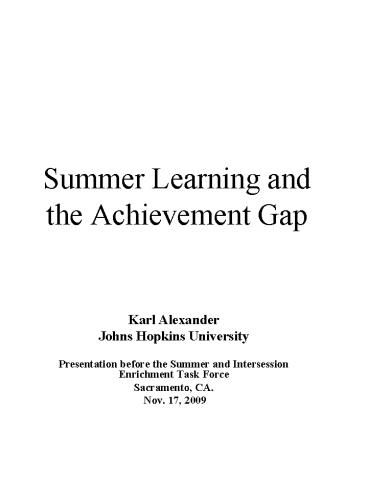Summer Learning and the Achievement Gap - PowerPoint PPT Presentation
1 / 9
Title:
Summer Learning and the Achievement Gap
Description:
Johns Hopkins University. Presentation before the Summer and Intersession Enrichment Task Force ... America doesn't have a school problem. It has a summer ... – PowerPoint PPT presentation
Number of Views:54
Avg rating:3.0/5.0
Title: Summer Learning and the Achievement Gap
1
Summer Learning and the Achievement Gap
- Karl Alexander
- Johns Hopkins University
- Presentation before the Summer and Intersession
Enrichment Task Force - Sacramento, CA.
- Nov. 17, 2009
2
THE BALTIMORE BEGINNING SCHOOL STUDY(N 790)
- An At Risk Population, drawn from 20 Baltimore
City public schools - 55 African-American (45 white)
- 68 low income households
- 38 of parents high school dropouts
- 44 in single parent households in first grade
(56 of African-American children) - 50 held back thru middle school
- 40 high school dropout
- Research Design
- Long-term, longitudinal 1982 2005/06
- Coverage starts in first grade
- Representative random sampling of schools and
children from throughout Baltimore - Mirrors the face of the city black and white
across a range of family incomes - Frequent, closely spaced data gathering from
primary sources - Fall and spring achievement testing, annually
through 5th grade
3
Figure 1
CAT Reading Averages over Five Years, by SES Level
Fall 82 Fall 1st Grade Spring 87 Spring
5th Grade
Disadvantaged Children Begin First Grade Already
Behind and Lose Ground Over Time
4
Chart 1
SCHOOL YEAR CUMULATIVE GAINS
Disadvantaged, by Year
Better-Off, by Year
SUMMER CUMULATIVE GAINS
Disadvantaged, by Year
Better-Off, by Year
Disadvantaged Children Keep Up During the School
Year, Fall Behind During the Summer
Cumulative scale score gains on the California
Achievement Test in reading over the elementary
school years and summers. Sample consists of
Baltimore Public school students who entered
first grade in 1982.
5
Chart 2 CAT-R Averages over Five Years, by SES
Level, Projecting Summer and Winter Gains
Year-Round
The Achievement Gap Widens During the Summer
Months, Holds Steady During the School Year
6
Early Summer Learning Differentials and the 9th
Grade Achievement Gap, Selected Comparisons
9th Grade Achievement Gap 74 CAT-R Points
9th Grade Achievement Gap 116 CAT-R Points
9th Grade Achievement Gap 133 CAT-R Points
And What of Consequences Later? Differential
Summer Learning from the Elementary Years
Accounts for 2/3rds of the 9th Grade Achievement
Gap across Social Lines
7
Insights from a Seasonal Perspective on Learning
- Children learn more, and learn more efficiently
when in school - During the school year, lower-income childrens
skills improve at about the same rate as
upper-income childrens - During the summer, lower-income childrens skills
do not improve, while upper-income childrens
skills continue to improve - Summer learning shortfall over the elementary
grades experienced by low-income children has
consequences that reverberate all throughout
childrens schooling, into high school and beyond
8
(No Transcript)
9
- "Virtually all of the advantage that wealthy
students have over poor students is the result of
differences in the way privileged kids learn when
they are not in school. America doesnt have a
school problem. It has a summer vacation problem
" - Malcolm Gladwell, Outliers, pp. 258 - 260































